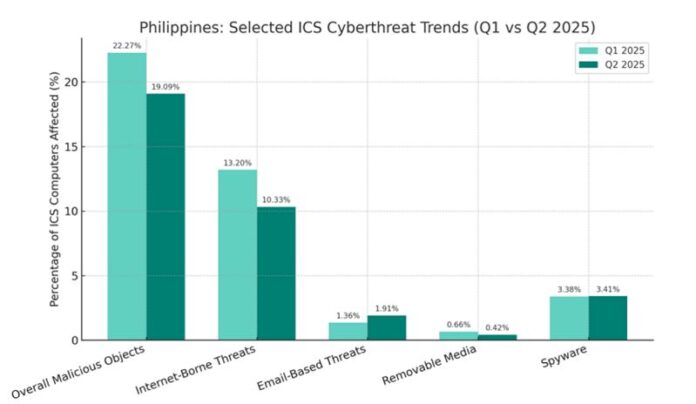Asia-Pacific Kaspersky Industrial Cybersecurity Conference (KICS) is a global event in the field of industrial cybersecurity that annually brings together leading information security experts, researchers, industrial automation suppliers, system integrators, and customers from around the world. At this year’s conference, Kaspersky warns that the Philippines remains one of the countries in Southeast Asia that is most at risk for industrial cyberattacks, facing persistent and growing threats to its operational technology systems.
Based on the latest Kaspersky Industrial Control Systems Cyber Emergency Response Team (ICS CERT) report, the Southeast Asia cluster recorded the highest global rates of viruses and AutoCAD malware detected on industrial control system (ICS) computers.
The report showed that 19.09 percent of ICS computers in the Philippines had malicious objects blocked in the second quarter of this year, slightly down from 22.27 percent during the first quarter. In terms of the percentage of ICS computers on which threats from the internet were blocked, the Philippines recorded 10.33 percent in the second quarter of this year, slightly down from 13.20 percent in the first quarter, showing a decline but still reflecting considerable exposure to internet-borne attacks.
Sam Yan, head of sales for Asia Emerging Countries at Kaspersky said Kaspersky’s latest report shows that industrial cyberthreats remain a significant challenge for the Philippines and the wider Southeast Asian region.
“While some attack vectors have seen a slight decline, the overall trend highlights the importance of maintaining strong defenses,” he said. “Organizations need to continuously strengthen their cybersecurity posture through regular assessments, timely updates, and capacity-building for both IT and OT teams to stay resilient against evolving threats”.
The report also showed that the percentage of email clients as a source of threats in the region has been increasing for two consecutive quarters. The Philippines particularly recorded 1.91 percent in the second quarter of 2025, up from 1.36 percent in the previous quarter.
Beyond email-based threats, removable media remained another front of concern. The Philippines posted 0.42 percent in the second quarter of 2025 from 0.66 percent in the previous quarter, suggesting modest progress but continued exposure.
In terms of the percentage of ICS computers on which spyware was blocked, the Philippines recorded 3.41 percent in the second quarter of 2025, slightly up from 3.38 percent in the first quarter of 2025, showing that spyware — including spy Trojans, backdoors, and keyloggers — continues to pose a steady threat to local industrial environments.
For comprehensive protection of industrial and critical sectors in the Philippines, Kaspersky offers a distinctive ecosystem that seamlessly integrates dedicated OT-grade technologies, expert knowledge and invaluable expertise. At the core of this ecosystem is Kaspersky Industrial CyberSecurity (KICS), a native Extended Detection and Response (XDR) platform designed for critical infrastructure protection. It provides robust network traffic analysis, along with endpoint protection, detection and response capabilities. This comprehensive solution integrates traditional IT security measures with purpose-built industrial security technologies, ensuring that your company is well-equipped to face any threat.
